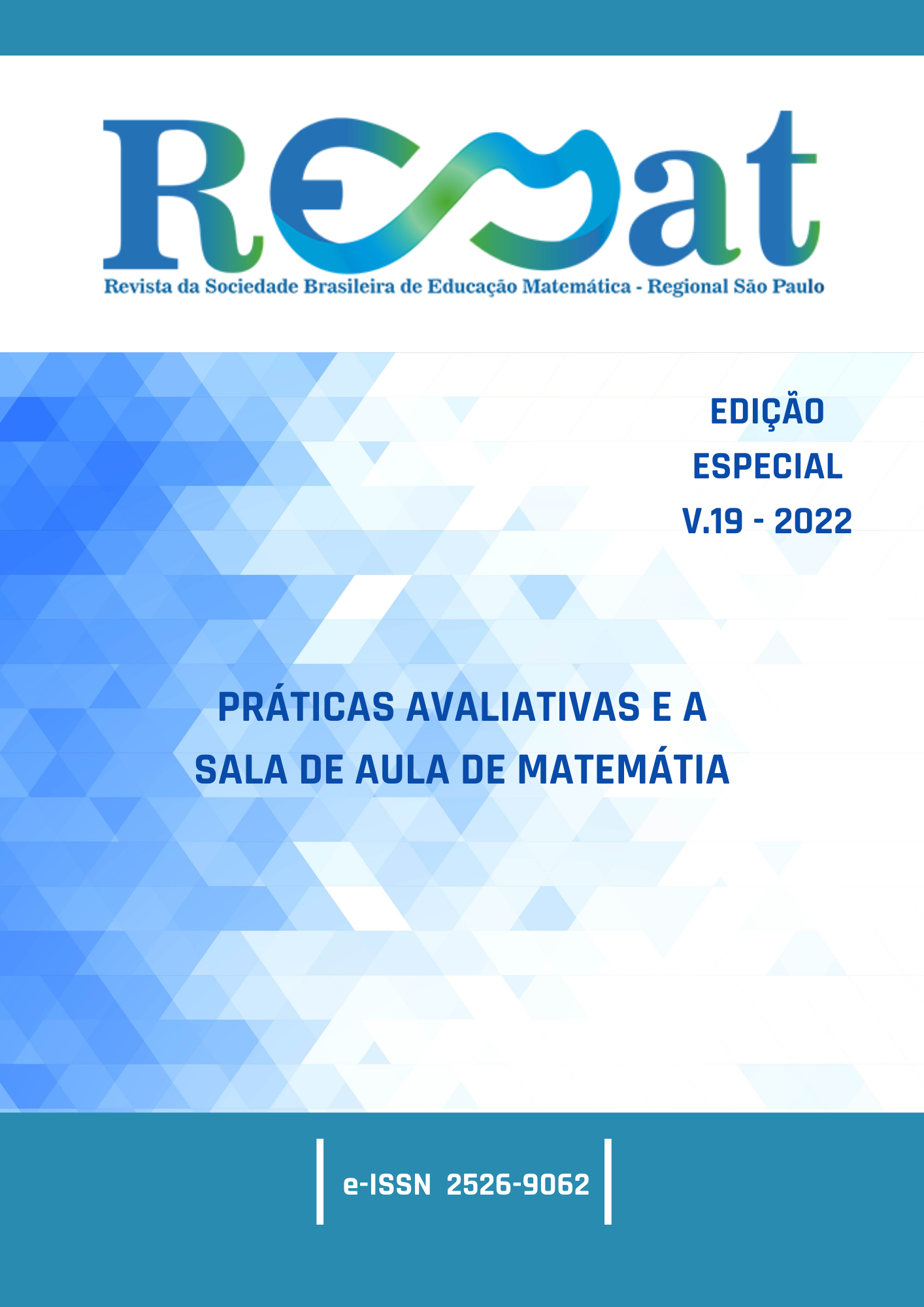Learning assessment and Feedback: an investigative experience in a remote classroom
DOI:
10.37001/remat25269062v19id667Keywords:
Formative Assessement in Mathematics, Feedback, Didactical SequenceAbstract
In this manuscript, we report an exploratory study built in the context of an institutional program for initial teacher training at Universidade Federal Fluminense. Considering the context of the Covid-19 pandemic, in which schooling was made possible by the contingency of remote learning, we performed a didactic sequence performed in 4 moments (3 synchronous and 1 asynchronous), which explored the concepts of area and perimeter with 25 students from the 6th year of elementary school. The study methodology was based on the qualitative perspective of exploratory studies in which we aimed to investigate the effects of feedback on student learning. We base the theoretical perspective of the investigation according to the conceptions of formative assessment discussed in the current and established literature in the field. In the analysis of the answers found, we realized that the formative feedback inserted in the presented evaluations worked to establish a positive dialogue between teachers and students, it collaborated to deconstruct the outdated idea of "error" as a subjective factor inherent to students in the learning process and it elevated the self-esteem of students who thought they were incapable of mathematical subjects.
Downloads
Metrics
References
BARRIGA, A. D. Impacto das políticas de avaliação e de qualidade nos projetos curriculares. In: LOPES, A. C.; ALBA, A. (Orgs.). Diálogos curriculares entre Brasil e México. Rio de Janeiro: Ed. UERJ, pp. 147-175, 2014.
BIANCHINI, E. Matemática Bianchini 6° ano: Manual do professor. 9. ed. São Paulo: Moderna, 2018.
BLACK, P., WILIAM, D. (1998a). Assessment and Classroom Learning. Assessment in Education: Principles, Policy & Practice, 5, 7-74. https://doi.org/10.1080/0969595980050102
BLACK, P.; WILIAM, D. (1998b) Inside the Black Box: Raising Standards through Classroom Assessement. The Phi Delta Kappan, 35(2), p. 139-148, 1998.
BONAMINO, A.; ZÁKIA, S. Três gerações de avaliação da educação básica no Brasil: interfaces com o currículo da/na escola. Educação e Pesquisa, São Paulo, v. 38, n. 2, pp. 373-388, abr./jun. 2012. Disponível em: http://www.scielo.br/pdf/ep/v38n2/aopep633.pdf. Acesso em 15 set. 2021.
BRASIL. Ministério da Educação. Base Nacional Comum Curricular. Brasília, 2017.
BRASIL. Parâmetros Curriculares Nacionais: Matemática: terceiro e quarto ciclos do ensino fundamental: introdução aos parâmetros curriculares nacionais. Brasília: MEC/SEF, 1998.
FERNANDES, D. Acerca da articulação de perspectivas e da construção teórica em avaliação educacional. In: ESTEBAN, M. T.; AFONSO, A. (Org.). Olhares e interfaces: reflexões críticas sobre a avaliação. 1. ed. São Paulo: Cortez, 2010. v. 1. 173p.
FERNANDES, D. Avaliação das aprendizagens no Sistema Educativo Português. Educação e Pesquisa, v.33, n.3, p. 581-600, São Paulo, 2007. Disponível em:
http://www.scielo.br/pdf/ep/v33n3/a13v33n3.pdf. Acesso em 10 set. 2021.
FERNANDES, D. Para uma teoria da avaliação formativa. Revista Portuguesa de Educação, v. 19 (nº. 2), pp. 21-50, 2006, Disponível em: http://www.scielo.mec.pt/pdf/rpe/v19n2/v19n2a03.pdf. Acesso em 4 set. 2021.
FERNANDES, D. Para uma teoria da avaliação no domínio das aprendizagens. Estudos em Avaliação Educacional, v.19, n.41, p.347-372,2008. Disponível em:
http://www.fcc.org.br/pesquisa/publicacoes/eae/arquivos/1454/1454.pdf. Acesso em: 12 set. 2021.
HATTIE, J., TIMPERLEY, H. (2007). The Power of Feedback. Review of Educational Research, 77, 81-112. https://doi.org/10.3102/003465430298487
KISHIMOTO, T. M. O Jogo e a educação infantil. São Paulo: Pioneira Thomson Learning, 1994.
MOURAD, V. A. A.; LUCAS, A. E. P. S.; AMARO, G. S. Prática Libertadora: expandindo o mundo através da educação. Dignidade Re-Vista, v.7, n.12, jul. 2021.
NERI, M.; OSÓRIO, M. C. Tempo para Escola na Pandemia (Sumário Executivo). FGV Social, out/2020, Rio de Janeiro, 2020. Disponível em: http://www.fgv.br/cps/TempoParaEscola. Acesso em: 2 fev. 2021.
National Council of Teachers of Mathematics (NCTM) (2007). Benefits of Formative Assessment. NCTM. Disponível em: https://www.nctm.org/Research-and-Advocacy/Research-Brief-and- Clips/Benefits-of-Formative-Assessment/
OCDE (2018). Brasil no Pisa 2018. Disponível em: https://download.inep.gov.br/publicacoes/institucionais/avaliacoes_e_exames_da_educacao_basica/ relatorio_brasil_no_pisa_2018.pdf.
PhET: Construtor de Áreas. Universidade do Colorado: PhET interactive simulations, s.a. Disponível em: <https://phet.colorado.edu/sims/html/area-builder/latest/area-builder_pt_BR.html>. Acesso em: 10 ago. 2021.
PINTO, J. Avaliação Formativa: uma prática para a aprendizagem. In: ORTIGÃO, M. I. R. et al. (org.). Avaliar para aprender no Brasil e em Portugal: perspectivas teóricas, práticas e de desenvolvimento. Curitiba: CRV, 2019. v. 1, p. 19-44.
ROSADO, A., SILVA, C. Conceitos básicos sobre avaliação das aprendizagens. 2014. Disponível em:
http://api.adm.br/evalforum/wp-content/uploads/2010/07/200_-rosado-e-silva-conceitos-basicos- sobre-avaliacao-das-aprendizagens.pdf. Acesso em 12 out. 2021.
VAZ, R. F. N.; NASSER, L. Um Estudo sobre o Feedback Formativo na Avaliação em Matemática e sua Conexão com a Atribuição de Notas. Bolema, Rio Claro (SP), v. 35, n. 69, p. 1-21, abr. 2021. http://dx.doi.org/10.1590/1980-4415v35n69a01
WILEY, D. A. Learning object design and sequencing theory. Unpublished doctoral dissertation, Brigham Young University. 2000. Disponível em: http://reusability.org./read/
ZABALA, A. A prática educativa: como ensinar. Porto Alegre: Artmed, 1998.
Downloads
Published
Métricas
Visualizações do artigo: 656 PDF (Português (Brasil)) downloads: 169
How to Cite
Issue
Section
License

This work is licensed under a Creative Commons Attribution-NonCommercial-NoDerivatives 4.0 International License.


 Português (Brasil)
Português (Brasil)
 Español (España)
Español (España)
 English
English






































